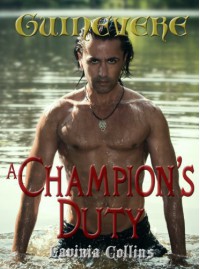An absorbing retelling of the Arthurian stories

A Champion’s Duty, by Lavinia Collins, is the middle section of a trilogy following the Arthurian story cycle, as seen through the eyes of Guinevere. I have not yet read the first book – I downloaded this instalment as a promotional copy from Amazon – and in part was curious as to how far the book made sense on its own.
On this count I am very happy to say that it made perfect sense – of course there were places where previous events were referenced, but never in a way that left you lost. As befits the middle of a trilogy, the story ends with the central characters stranded in a seemingly desperate situation.
Lavinia has followed the rather ambiguous information in her source materials in order to place the story. Clear late Medieval signals such as plate armour and Saracen champions sit in a much older context in which England – and Europe – was still split into a myriad tiny principalities, and Rome was a powerful force within living memory. Superior kings such as Arthur attract lesser local lords into their retinue, knowing that if their might or reputation slips, their following will vanish again, or turn hostile. Real places and events live alongside Christian and pre-Christian symbolic ones. The story is not quite historical fiction, not quite fantasy, but something in between.
The main focus of this book is the conflicted feelings that Guinevere has for both Arthur and Lancelot. A queen’s life in this martial society was both lonely and dangerous, but Lavinia compellingly portrays Guinevere as driven by overwhelming attraction for both men. She is neither simply looking for a bored-housewife style diversion nor passively exploited by those around her. Guinevere’s perspective, as an independently minded, passionate and determined woman in a world governed by warlike men, provides a refreshing view on the expected world of battles and jousts.
The book was let down by some careless editing and proofreading, including some apparently random nonsense sequences of letters which had slipped through the editorial net. This was particularly surprising given the overall quality of the imagination and characterisation.
The other main difficulty – which Lavinia grapples with throughout the book – is how to retell a story which has so many well known episodes in it. She successfully threads a way between a straight historicised version on the one hand, and magical mysticism on the other, but it is a hard task that she has set herself.
On balance for me this was another 4* book. I am very glad to have taken advantage of the promotion, and am curious to see how Lavinia tackles the story’s end, but will have a pause before purchasing #3 to let this one sink in a little more.


